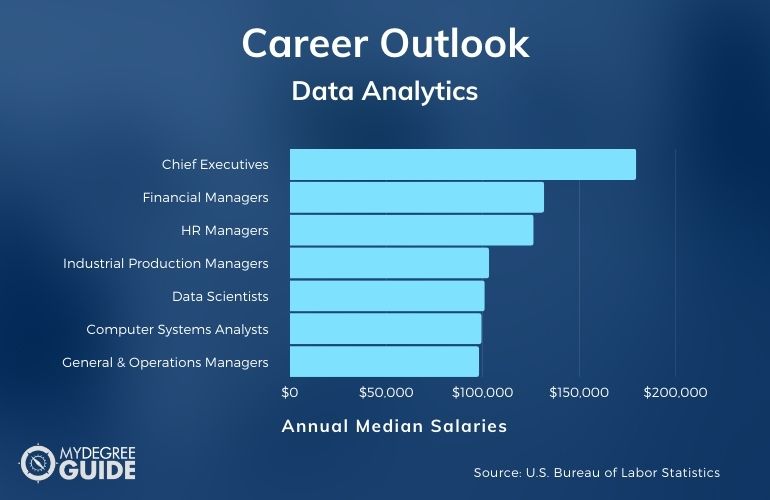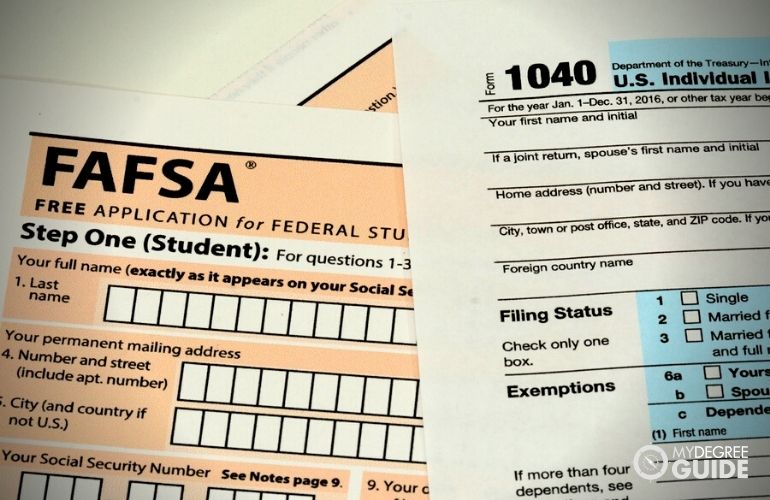If you enjoy drawing conclusions from large data sets that can help businesses grow, you may be interested in pursuing an MBA in Data Analytics.

MBA programs typically provide students with a foundational knowledge of business administration and management. With a concentration in data analytics, your studies would also focus on topics specific to that field, such as data modeling and statistics. Professionals in data analytics can work in all sorts of industries, typically in analytics, management, financial, or data scientist roles.
Editorial Listing ShortCode:
You might pursue this graduate degree if you want to transition into a data-focused role or want to grow in your current career.
Online MBA in Data Analytics Programs

A Master of Business Administration (MBA) with a concentration in data analytics is a versatile degree that teaches students how to analyze, manage, and draw conclusions from complex sets of data. Data analytics roles are often highly influential in an organization.
Editorial Listing ShortCode:
Data analytics professionals are needed by a wide range of companies, so professionals in the field may work in various industries, including the following:
- Finance
- Government
- Insurance
- Healthcare
- Education
- Non-profit
- Marketing
- Fashion
- Manufacturing
- Technology
- Scientific research
- Legal
While you’re enrolled in an MBA program in data analytics, you may study some of the following topics:
- Business strategy
- Statistics
- Economics
- Data visualization
- Data acquisition
- Data-driven decision making
- Financial planning and reporting
- Data modeling
- Business intelligence
- Data warehousing
MBA students typically have a bachelor’s degree, and they may also have a few years of work experience. Some MBA programs like to see potential students’ resumes in addition to other application materials.
MBA programs in data analytics focus their coursework on the concentration, but they also provide a foundation of business classes. These may cover topics like marketing, human resources, corporate responsibility, leadership, and more.
Classes in these types of programs typically teach you skills and theories and then show you how to apply your knowledge in real-world situations. You might have the opportunity to participate in research, capstone projects, or internships. Some graduates plan to use this degree to grow in an already established career or to pivot into a new type of role involving data analytics.
Common roles for professionals in the field include financial managers, data scientists, computer systems analysts, and market research analysts.
Data Analytics Careers & Salaries

Data analytics MBA programs can help you develop versatile and in-demand skill sets. As a result, graduates may pursue roles in almost any industry.
Various types of businesses need qualified professionals who are capable of crunching the numbers to help management make data-driven decisions. Common jobs that graduate work toward include data scientist, management analyst, budget analyst, and operations research analyst. With experience in the field, they may also pursue management and leadership positions.
According to the Bureau of Labor Statistics, below are the median salaries of some careers associated with data analytics.
| Careers | Annual Median Salaries |
| Chief Executives | $179,520 |
| Financial Managers | $131,710 |
| Human Resources Managers | $126,230 |
| Industrial Production Managers | $103,150 |
| Data Scientists | $100,910 |
| Computer Systems Analysts | $99,270 |
| General and Operations Managers | $97,970 |
| Financial Analysts | $95,570 |
| Management Analysts | $93,000 |
| Operations Research Analysts | $82,360 |
The Bureau of Labor Statistics projects that several of these careers will grow faster than average over the next ten years. For example, management analysts, financial analysts, and financial managers are expected to see 11%, 9%, and 17% job growth, respectively.
Editorial Listing ShortCode:
Professionals may also work in roles that don’t directly have the analyst title but still involve looking at data to help companies grow and optimize. These roles include auditors, supply chain managers, operations managers, and compensation, benefits, and job analysis specialists.
Data Analytics MBA Curriculum & Courses

Schools that offer an MBA with data science can have varying curriculum, but here are a few classes focused on data analytics that you may see:
- Database Design and Data Modeling: This class teaches you various ways to examine data sets, including through SQL queries and normalization.
- Data Visualization, Design, and Presentation: You’ll learn how to present your data-related findings to others through mapping data attributes, creating strategic visual encoding, and more.
- Financial Reporting and Disclosure: This course dives into how financial information is used in various types of organizations, and it teaches you how to analyze this type of data.
- Data-Driven Decision Making: You’ll learn how to address issues with a variety of qualitative and quantitative methods.
- Applied Statistics for Data Analytics: This class merges data analytics with statistics, and it shows you how to use statistical processes like hypothesis testing and regression analysis.
- Database Management and Policies: You’ll learn a variety of query languages and database system architecture techniques to secure large and important databases in businesses.
- Foundations of Analytics and Big Data: This course teaches you how valuable data storytelling can be and how data-driven decisions can have a big impact on organizations.
- Data Warehousing and Business Intelligence: You’ll learn how to use these types of systems to examine various data sets.
- Data Analysis for Managers: This class focuses on how valuable data-driven decision making can be across a variety of business sectors.
- Decision Analytics: You’ll learn how to make effective decisions with a variety of methods, including sensitivity analysis and integer linear programming.
Your curriculum may also include opportunities for capstone projects, research, and internships. These types of projects can be valuable in MBA programs, as they may allow you to meet other students and network while you are in school.
Admissions Requirements

The admissions requirements for MBA programs in data analytics vary, but here are a few you may encounter:
- Bachelor’s degree
- Undergraduate transcripts
- GRE or GMAT scores (only some schools require them)
- Resume
- Statement of intent
An MBA program may ask to see your resume since these programs are typically very career focused. Additional requirements might include letters of recommendation and an in-person or virtual interview. Some schools may have a minimum undergraduate GPA requirement as well, which they can verify through your transcripts.
Accreditation

When choosing a school for your data analytics MBA program, it could be strategic to only consider ones that are regionally accredited. This status means that a third-party accrediting organization has determined that the school meets a series of high-quality educational requirements.
When you’re looking for jobs or a promotion after graduation, many employers want to verify that you earned your MBA at a regionally accredited school. Many financial aid programs also require applicants to attend an accredited school.
Editorial Listing ShortCode:
To learn more about accreditation, you can visit the US Department of Education’s website.
Financial Aid and Scholarships

If you’re planning to seek financial aid to help pay for your MBA in Data Analytics, the Federal Student Aid website has a variety of options that are available to qualifying students. You can browse different types of student loans, work-study programs, and more.
Graduate students may be able to apply for direct unsubsidized loans, in which your school determines how much money you can borrow. Students are responsible for the interest on these types of loans, but they don’t have to show financial need. You can also see if you qualify to apply for any scholarships from your school or outside organizations.
If you are already working in the field, you can see if your employer offers any tuition benefits or reimbursement programs.
What Can You Do with an MBA in Data Analytics?

An MBA in Data Analytics could open up a wide range of job prospects for graduates. Professionals in the field typically work in analytics roles or related positions where they can use data to help their organizations make strategic, informed decisions.
Careers related to business management and data analytics include auditor, computer systems analyst, management analyst, financial analyst, data scientist, and operations research analyst. MBA graduates may also work toward senior or leadership roles, like financial manager, HR manager, operations manager, supply chain manager, and chief executive.
Management and leadership positions also tend to require years of work experience. It may be worth noting that a number of universities also offer on-campus or online PhD in Data Analytics programs for those wishing to pursue a doctorate degree.
How Long Does It Take to Get an MBA in Data Analytics Online?

Most online masters degree in data science programs can be completed in 1 to 2 years with full-time study. The timeframe for completing an MBA in Data Analytics online varies based on your schedule flexibility, outside obligations, and the requirements of the program you choose.
If you pursue a 36 credit hour program that does not require a thesis, you may be able to graduate in 1 year with full-time and year-round enrollment, including during the summer. If your program has a thesis requirement, or if you attend part-time or take summers off, your program may take longer to complete.
What’s the Difference Between an MBA in Business Analytics vs. Data Analytics?

While there is significant overlap between Master of Business Administration (MBA) programs in business analytics and data analytics, there are a few key differences between these degree paths.
An MBA in Data Analytics focuses on:
- Different methods of analyzing data
- Performing thorough statistical analysis
An MBA in Business Analytics focuses on:
- Making data-driven decisions
- Communicating the business implications of data sets
In general, data analytics professionals spend more time gathering and analyzing data, while business analytics professionals figure out how to translate data sets into smart business decisions.
Is an MBA in Data Analytics Worth It?

Yes, an MBA in Data Analytics is worth it for many students. The Bureau of Labor Statistics projects that many roles associated with data analytics, such as management analysts and financial managers, will grow faster than average over the next ten years.
Editorial Listing ShortCode:
These roles are also found in a wide range of industries, and analytics jobs often work closely with top management in an organization. With experience, MBA graduates may become top executives themselves. Overall, business and financial occupations are expected to see 7% job growth over the next ten years, and management occupations are projected to grow by 8% (Bureau of Labor Statistics).
Universities Offering Online MBA in Data Analytics Degree Programs
Methodology: The following school list is in alphabetical order. To be included, a college or university must be regionally accredited and offer degree programs online or in a hybrid format.

Colorado Technical University offers an online program for an MBA in Data Analytics. The program requires the completion of 48 credits of coursework such as Data Analytics for Business, Advanced Cost Accounting, and Data Analytics Visualization and Presentation. There are commonly 9 start dates every year, and classes are typically 5 weeks long. The program may be completed in 1 year.
CTU is accredited by the Higher Learning Commission.

Florida Gulf Coast University offers an online program for an MBA with a concentration in Data Analytics. The program is designed to help develop a broad-based business background with courses such as Managerial Accounting, Managerial Economics, and Financial Management. The program requires the completion of 33 credit hours and may be completed in 1 year.
FGCU is accredited by the Southern Association of Colleges and Schools Commission on Colleges.

Herzing University offers an online program for an MBA in Data Analytics. Classes are commonly offered during both the daytime and in the evening to accommodate different schedules. Access to extensive virtual services such as tutoring, tech support, and academic advising is often available. The program requires the completion of 33 to 36 credit hours.
Herzing University is accredited by the Higher Learning Commission.

Indiana Wesleyan University offers an MBA in Data Analytics program online. Potential courses include Marketing Management, Financial Reporting and Analysis, and Ethical and Legal Aspects of Management. Courses aim to teach problem-solving skills by including projects based on real-life scenarios. There are typically multiple start dates every year.
Indiana Wesleyan University is accredited by the Higher Learning Commission.

Longwood University offers an online program for a Master of Business Administration with a track in Data Analytics. Potential courses include Financial Management, Strategic Management and Business Policy, and Information Technology. The program requires 31 credit hours and can potentially be completed in 10 months.
Longwood University is accredited by the Southern Association of Colleges and Schools Commission on Colleges.

Louisiana State University offers an online program for an MBA with a concentration in Data Analytics. Potential coursework includes Managerial Use of Accounting Data, Economic Analysis for Management, Financial Management, and Visualization of Data for Business. The program requires the completion of 30 credit hours, and may be finished in 10 months.
Louisiana State University is accredited by the Southern Association of Colleges and Schools Commission on Colleges.

Maryville University offers an MBA in Data Analytics program online. The curriculum typically teaches hands-on, in-demand skills using R, Python, and PowerBI. The program requires a total of 9 courses and a capstone project, for a total of 30 credit hours. There are commonly 6 start dates throughout the year.
Maryville University is accredited by the Higher Learning Commission.

Ottawa University offers an online program for an MBA with a concentration in Business Data Analytics. Potential courses include Organizational Behavior and Theory, Value Systems and Professional Ethics, and Management Information Systems. Courses are commonly 8 weeks long.
Ottawa University is accredited by the Higher Learning Commission.

Southeastern Oklahoma State University offers an online program for a Master of Business Administration with a concentration in Data Analytics. Potential courses include Management Economics, Marketing Analytics, and Research Methods. The program requires the completion of 36 credit hours and can often be completed in 12 months. The curriculum aims to teach real-world applications and problem-solving.
Southeastern Oklahoma State University is accredited by the Higher Learning Commission.

Southern Oregon University offers an online program for a Master of Business Administration with a concentration in Business Analytics. Hands-on projects and exercises under the guidance of supportive faculty are offered. The 45 credit program can often be completed in 16 months. Classes are typically 7 weeks long, and there are usually multiple start dates every year.
Southern Oregon University is accredited by the Northwest Commission on Colleges and Universities.

Texas A&M University–Corpus Christi offers an online program for a Master of Business Administration with a concentration in Data Analytics. The program requires the completion of 36 credit hours and can often be finished in 1 to 2 years. Courses are typically 7 weeks long and are designed to be flexible to help earn a degree while working.
Texas A&M University-Corpus Christi is accredited by the Southern Association of Colleges and Schools Commission on Colleges.

Tiffin University offers an MBA in Data Analytics program online. Potential courses include Database Design and Data Modeling, Applied Statistics for Data Analytics, and Advanced Data Analysis Techniques. The program requires 32 to 36 credits and can often be completed in 14 months. Hands-on training under faculty with real-world experience is typically offered in the program.
Tiffin University is accredited by the Higher Learning Commission.

The University of North Carolina–Chapel Hill offers an online MBA program with a concentration in Data Analytics and Decision Making. Potential courses include Analytical Tools for Decision Making, Business Modeling, and Introduction to Python for Business Analytics.The program typically offers access to 1 on 1 career guidance.
The University of North Carolina at Chapel Hill is accredited by the Southern Association of Colleges and Schools Commission on Colleges.

The University of Southern Indiana offers an online program for an MBA with a concentration in Data Analytics. Coursework includes Leadership Skills and Innovation, Applied Business Analytics, and Accounting for Decision Making and Control. The 30 credit program can potentially be completed in just 11 months.
The University of Southern Indiana is accredited by the Higher Learning Commission.

Walsh University offers an MBA in Data Analytics program online. Typically, 1 course lasting 8 weeks is taken each term. The program requires the completion of 35 credit hours. There are often 6 start dates every year, and the program may be completed in 1 year.
Walsh is accredited by the Higher Learning Commission.
Getting Your MBA in Data Analytics Online

If you enjoy using data to help make strategic business decisions, you might enjoy pursuing an MBA in Data Analytics online. Online masters in data analytics programs often allow additional flexibility, which could be especially helpful for working professionals.
MBA programs typically provide a core foundation of business classes in marketing, management, human resources, and more. With a data analytics concentration, you could also dive into specialized topics like data visualization, data modeling, and data-driven decision making.
To take the first step toward your MBA in Data Analytics, you could start researching your program options from accredited universities today.

